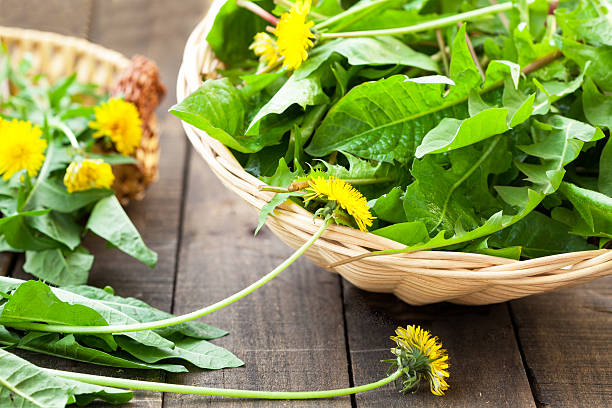Dandelion (Taraxacum officinale) is a flowering plant that is native to Europe, Asia, and North America. It has long been used in traditional medicine as a natural remedy for a variety of ailments, including liver and kidney problems, acne, and digestive issues. Dandelion is also believed to have anti-inflammatory, antioxidant, and diuretic properties. In addition to its medicinal uses, dandelion is also valued for its nutritional value.
The leaves, stems, and roots of the dandelion plant are all edible and can be consumed fresh or dried. Dandelion leaves are often used in salads or cooked as a leafy green vegetable, while the roots can be roasted and used as a coffee substitute. Dandelion flowers can also be used to make tea.
Dandelion is a good source of several essential nutrients, including vitamins, minerals, and fiber. The leaves are particularly rich in vitamins A, C, and K, as well as calcium, iron, and potassium. Dandelion leaves also contain small amounts of other vitamins and minerals, such as B vitamins,
magnesium, and zinc.
Dandelion roots are also a good source of nutrients, including vitamins B1, B2, and B3, as well as calcium, iron, and potassium. Dandelion roots also contain inulin, a type of fiber that acts as a prebiotic, promoting the growth of beneficial bacteria in the gut.
In addition to its nutritional value, dandelion is believed to have several health benefits. Here are a few:
May promote liver health: Some research suggests that dandelion may help protect the liver and support its function. A study published in the Journal of Ethnopharmacology found that dandelion extract significantly reduced liver damage in mice with chemically-induced liver injury. Another study published in the Journal of Alternative and Complementary Medicine found that dandelion extract helped improve liver function in people with non-alcoholic fatty liver disease.
May support kidney function: Dandelion is a natural diuretic, meaning it can help increase urine production and flush out excess fluids from the body. This property may be beneficial for people with kidney problems or those at risk of developing kidney stones.
May have anti-inflammatory effects: Some research suggests that dandelion may have anti-inflammatory properties, which may help reduce inflammation in the body. Inflammation is a normal immune response to injury or infection, but chronic inflammation has been linked to a range of health problems, including heart disease, diabetes, and cancer.
May have antioxidant effects: Dandelion is a good source of antioxidants, which are compounds that help protect the body against damage from free radicals. Free radicals are unstable molecules that can damage cells and contribute to the development of chronic diseases.
May improve digestion: Dandelion is a good source of fiber, which can help promote regular bowel movements and improve digestion. In addition, the prebiotic effect of inulin in dandelion roots may help support the growth of beneficial bacteria in the gut, which can further improve digestion and overall gut health.
Overall, dandelion is a nutritious and healthful food that may offer a range of potential health benefits. However, more research is needed to fully understand the extent of these benefits and how they can be effectively harnessed. If you’re interested in incorporating dandelion into your diet, it’s best to speak with a healthcare provider or a registered dietitian for guidance.

 Home
Home Health
Health Diet & Nutrition
Diet & Nutrition Living Well
Living Well More
More












